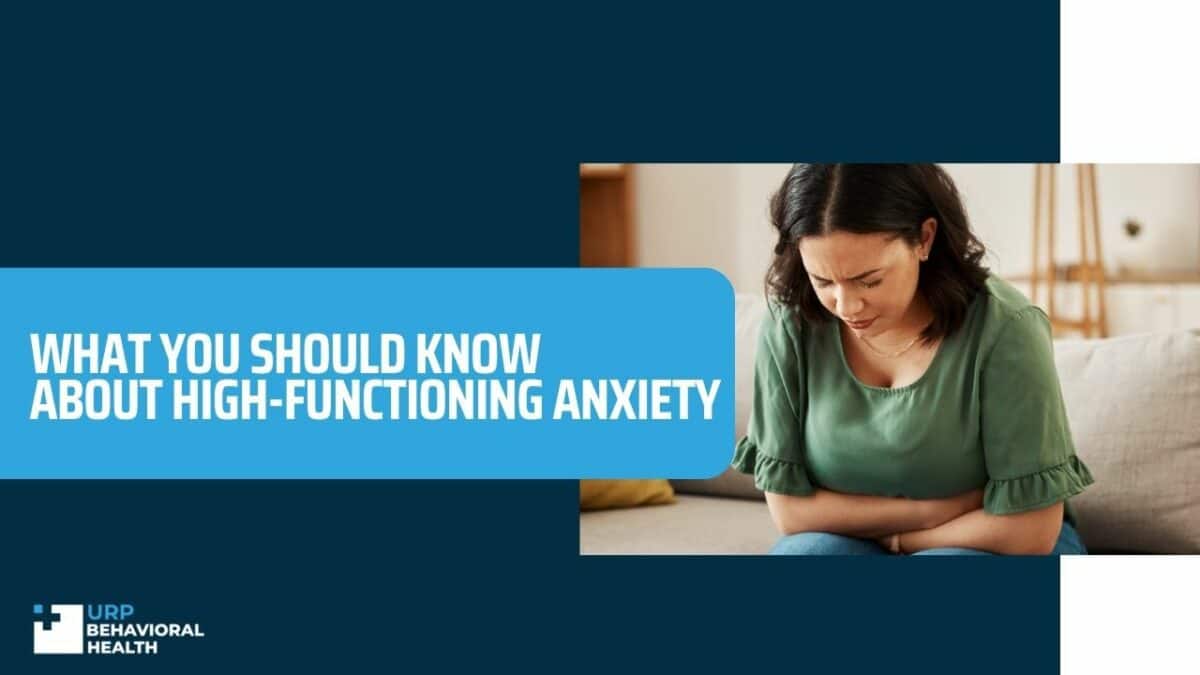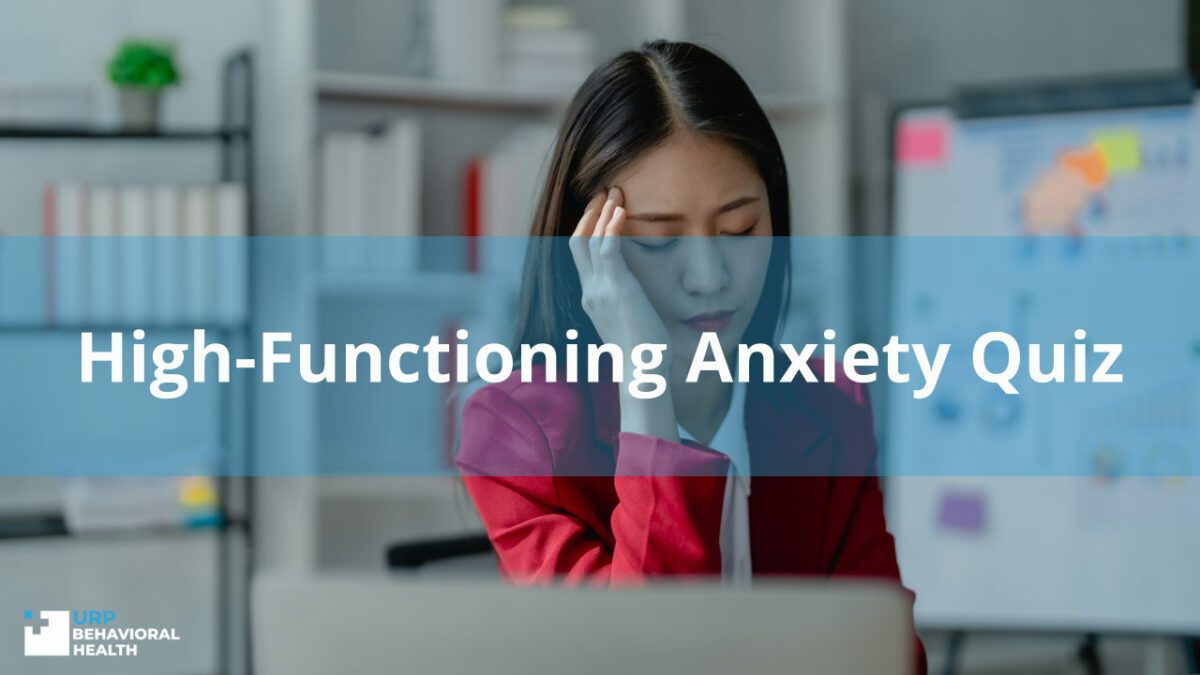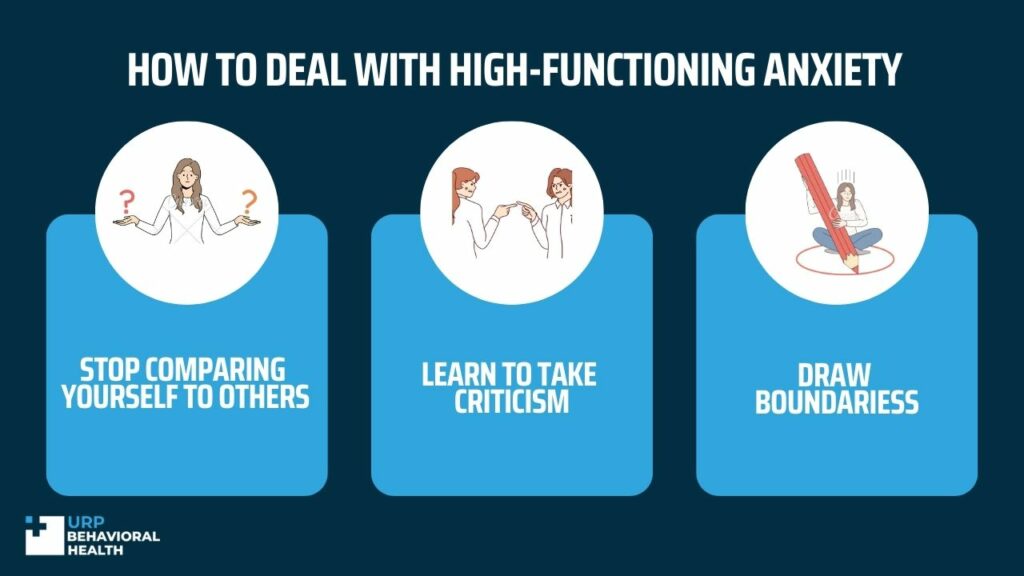
What You Should Know About High-Functioning Anxiety
Is your work performance above average? Stellar, even? Do your friends think you’re funny, calm, and have it all together? But what if, under that calm and collected exterior, you’re constantly anxious about making a mistake, disappointing others, and making a bad impression? That’s what high-functioning anxiety feels like.
Although it’s not a formally recognized diagnosis, researchers expect that it affects a large number of people. After all, over 31 percent of US adults [1] have an anxiety disorder at some point in their lives, making it one of the most common categories of mental disorders. So, it shouldn’t come as a surprise that many people live just below the noticeable threshold. So, let’s look at what high-functioning anxiety is, what signs to look out for, and how you can treat it.
Contact our admissions team now to begin your path toward a brighter future.

Signs That You Have High-Functioning Anxiety
Because high-functioning anxiety isn’t a disorder, professionals don’t refer to specific criteria. That’s because a core aspect of a disorder is that it impacts occupational and psychosocial functioning. In high-functioning anxiety, your anxiety pushes you to perform better instead of leaving you incapable of completing basic tasks.
That being said, mental health experts at URP Behavioral Health do look for certain signs, such as:
- Extreme worry about things ahead of time: For example, when the deadline for a project is a few weeks away, but you’re constantly thinking about it and are worried that you’ll make a mistake.
- Worrying about letting people down causes you to over-exert yourself and say ‘yes,’ even though you have a lot on your plate.
- Setting impossibly high standards for yourself: You may also know it as ‘striving for perfection’ and detail-oriented. It means that you focus on things until they seem perfect. Even then, you don’t feel satisfied.
- Working long hours: A subsequent sign of setting impossibly high standards is that you end up working long hours to achieve them. You may also agree to take on extra work to avoid letting your supervisor down.
- Immense mental stress because you’re constantly overthinking and worrying about things over time.
- Fear of being criticized by superiors or loved ones for poor performance or being a friend.
- Never taking a break because your to-do list is always full. And when you finish doing everything on your list, you start worrying.
- Have trouble falling asleep because you feel overly anxious and are thinking ahead.
- Overanalyzing and second-guessing every decision because you’re worried you’ll make a mistake.
- You’re constantly in need of reassurance that you did a good job and that you didn’t mess up.
High-Functioning Anxiety Quiz

Wondering if you have high-functioning anxiety? Here’s a quiz to help you determine whether your anxiety is doing more than improving your performance at work and in social settings.
- Are you constantly overanalyzing your interactions and second-guessing your decisions?
- Does the thought of failing at a task or making a mistake scare you?
- Is it impossible for you to say no when a friend, colleague, or manager makes a request?
- Do you have a habit of comparing yourself to others and feeling like you can’t measure up?
- Are you constantly worried about things going wrong in the future?
- Are you so anxious most of the time that you have a hard time relaxing?
- Do you prefer taking alcohol or illicit substances to feel less anxious?
- Are you worried about being criticized, rejected, or letting others down?
- Do you worry about major projects ahead of time?
- Do you always go the extra mile when doing a task because ‘good enough’ is never enough?
If you’ve answered yes to a few of these, then it’s possible that you’re struggling with high-functioning anxiety and need professional help.
Treatment for High-Functioning Anxiety

Just because you’re functioning ‘just fine,’ doesn’t mean you can’t benefit from professional help. When evaluated based on achievements, you may appear quite successful at work and in your relationships. But when your actions are fuelled by anxiety, it’s only a matter of time before you burn out.
Therefore, it’s best to seek appropriate treatment from a professional – even if you don’t have a disorder. Some of the treatment options you can potentially benefit from include:
Cognitive Behavioral Therapy

One of the most common treatment methods for high-functioning anxiety is cognitive behavioral therapy. It’s based on the concept that your unhelpful behaviors are the result of feelings that you interpret in a negative way.
But when you have high-functioning anxiety, your behaviors aren’t helpful but excessive to the point that you over-exert yourself. During CBT sessions, you’ll work with your therapist to unpack the feelings and thoughts that feed into your anxiety and cause you to over-work yourself.
By effectively changing the thoughts and beliefs that trigger your anxiety, you can strike a balance between good performance and mental well-being.
Group Therapy

While individual therapy in a one-on-one setting is quite effective for discussing your struggles, many people with high-functioning anxiety don’t get professional help because they think they’re ‘just fine.’ After all, you’re excelling at work, and your friends love you, so what if you feel mentally exhausted? Taking therapy in a group setting gives you the opportunity to reflect on your life’s circumstances by hearing other people’s experiences.
During group therapy sessions, you’ll relate to the fatigue, burnout, and exhaustion that other people with high-functioning anxiety feel. You’ll understand that you’re not alone and that you deserve to work on your mental well-being.
Mindfulness Training

Mindfulness is a crucial aspect of meditation and a skill that you learn in dialectical behavioral therapy. But even if you don’t undergo DBT, your therapist can teach you mindfulness techniques. These help you stay focused on the present moment instead of worrying about what will come later. This way, you’re no longer anxious about things ahead of time but can still prepare for them with a clear mind.
Medication

Although psychotherapy is usually recommended as a consistent treatment option for people with high-functioning anxiety, they can also rely on medication. Depending on your symptoms, your healthcare provider may prescribe anti-anxiety medications such as benzodiazepines or antidepressants like SSRIs.
Benzodiazepines work by enhancing levels of GABA, a neurotransmitter that blocks the transmission of nerve signals, thereby helping you feel calm. And because low levels of serotonin are associated with anxiety, doctors prescribe SSRIs to increase serotonin levels and alleviate anxiety.
How to Deal With High-Functioning Anxiety

Besides seeking treatment for high-functioning anxiety, you can also start making a few changes, such as:
Stop Comparing Yourself to Others
Many people with high-functioning anxiety compare themselves to other people, robbing themselves of the chance to experience joy and contentment. Learn to be proud of your abilities and do your best without comparing your efforts to someone else’s results.
Learn to Take Criticism
As a person with high-functioning anxiety, you may worry about getting criticism from your superiors and friends. They criticize and overwork themselves so other people don’t. But this can put you under a lot of mental strain. Your therapist can teach you to accept criticism from other people and evaluate their feedback in a more neutral way.
Draw Boundaries
When you establish boundaries, you learn about the importance of saying ‘no’ as a way of reinforcing those boundaries as well. But setting boundaries isn’t just about saying ‘no’ to things but saying ‘yes’ to potential opportunities and experiences as well. Sure, they may go beyond your comfort level but leave you fulfilled.
Pros and Cons of High-Functioning Anxiety

As a person with high-functioning anxiety, you experience both positives and negatives. Some of the pros include:
- Being helpful at work and home
- Being proactive about solving problems
- Being a hard worker and dedicated employee at your job
- Being detail-oriented so people praise you for going the extra mile
- You’re always ready to socialize with people
- You’re organized and get the job done
- You always have a backup plan for when things don’t go according to plan
But just as there are some pros to having high-functioning anxiety, there are cons as well. As a result, you’ll also go through:
- Sleep disturbances like insomnia, which prevent you from getting restful sleep
- You’re overly critical of yourself and what you do but, at the same time, fear criticism from others
- You’re worried about saying no to people and disappointing them
- You feel mentally exhausted
- You experience physical symptoms like headaches and muscle tension
- You’re at risk of abusing substances to calm your nerves
These problems can escalate as you enter unhealthy relationships and work settings because of your inability to say no and your fear of failure. Nevertheless, seeing a professional for your symptoms and getting appropriate treatment at the earliest can help you regain a sense of balance.
Reach out today and let us create a treatment plan designed around your needs.

References:
- Any Anxiety Disorder – NIMH. Link: https://www.nimh.nih.gov/health/statistics/any-anxiety-disorder
















